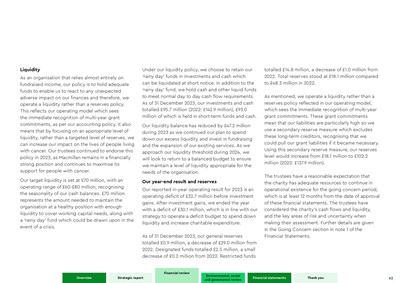
Liquidity
As an organisation that relies almost entirely on
fundraised income, our policy is to hold adequate
funds to enable us to react to any unexpected
adverse impact on our finances and therefore, we
operate a liquidity rather than a reserves policy.
This reflects our operating model which sees
the immediate recognition of multi-year grant
commitments, as per our accounting policy. It also
means that by focusing on an appropriate level of
liquidity, rather than a targeted level of reserves, we
can increase our impact on the lives of people living
with cancer. Our trustees continued to endorse this
policy in 2023, as Macmillan remains in a financially
strong position and continues to maximise its
support for people with cancer.
Our target liquidity is set at £70 million, with an
operating range of £60-£80 million, recognising
the seasonality of our cash balances. £70 million
represents the amount needed to maintain the
organisation at a healthy position with enough
liquidity to cover working capital needs, along with
a 'rainy day' fund which could be drawn upon in the
event of a crisis.
Under our liquidity policy, we choose to retain our
'rainy day' funds in investments and cash which
can be liquidated at short notice. In addition to the
'rainy day' fund, we hold cash and other liquid funds
to meet normal day to day cash flow requirements.
As of 31 December 2023, our investments and cash
totalled £95.7 million (2022: £142.9 million), £93.0
million of which is held in short-term funds and cash.
Our liquidity balance has reduced by £47.2 million
during 2023 as we continued our plan to spend
down our excess liquidity and invest in fundraising
and the expansion of our existing services. As we
approach our liquidity threshold during 2024, we
will look to return to a balanced budget to ensure
we maintain a level of liquidity appropriate for the
needs of the organisation.
Our year-end result and reserves
Our reported in-year operating result for 2023 is an
operating deficit of £32.7 million before investment
gains. After investment gains, we ended the year
with a deficit of £30.1 million, which is in line with our
strategy to operate a deficit budget to spend down
liquidity and increase charitable expenditure.
As of 31 December 2023, our general reserves
totalled £0.9 million, a decrease of £29.0 million from
2022. Designated funds totalled £2.5 million, a small
decrease of £0.2 million from 2022. Restricted funds
totalled £14.8 million, a decrease of £1.0 million from
2022. Total reserves stood at £18.1 million compared
to £48.3 million in 2022.
As mentioned, we operate a liquidity rather than a
reserves policy reflected in our operating model,
which sees the immediate recognition of multi-year
grant commitments. These grant commitments
mean that our liabilities are particularly high so we
use a secondary reserve measure which excludes
these long-term creditors, recognising that we
could pull our grant liabilities if it became necessary.
Using this secondary reserve measure, our reserves
level would increase from £18.1 million to £102.2
million (2022: £137.9 million).
The trustees have a reasonable expectation that
the charity has adequate resources to continue in
operational existence for the going concern period,
which is at least 12 months from the date of approval
of these financial statements. The trustees have
considered the charity's cash flows and liquidity,
and the key areas of risk and uncertainty when
making their assessment. Further details are given
in the Going Concern section in note 1 of the
Financial Statements.
62
Environmental, social
and governance review
Financial review
Strategic report
Overview Financial statements Thank you